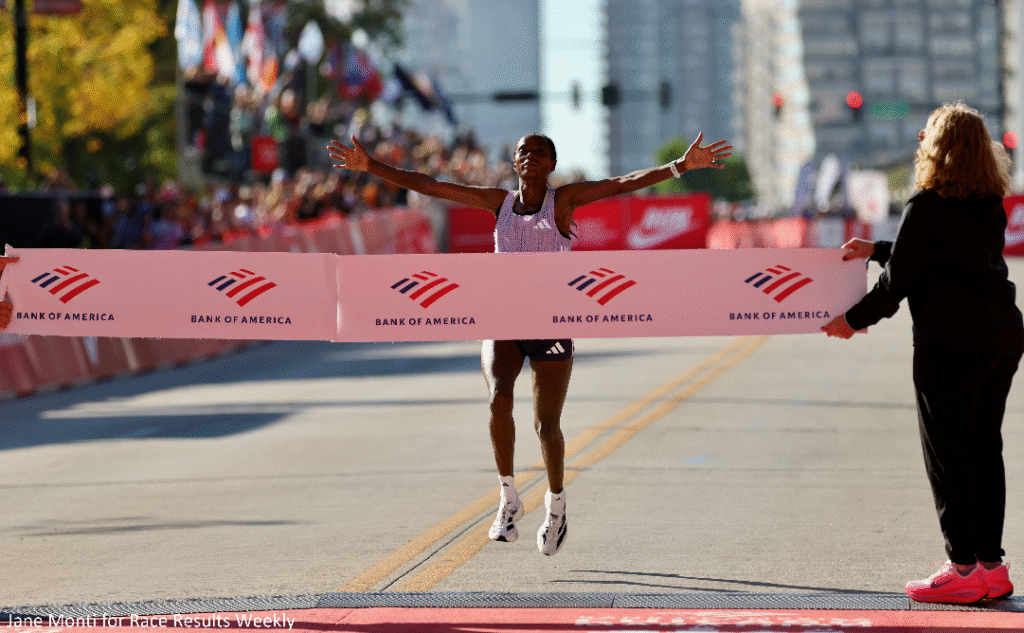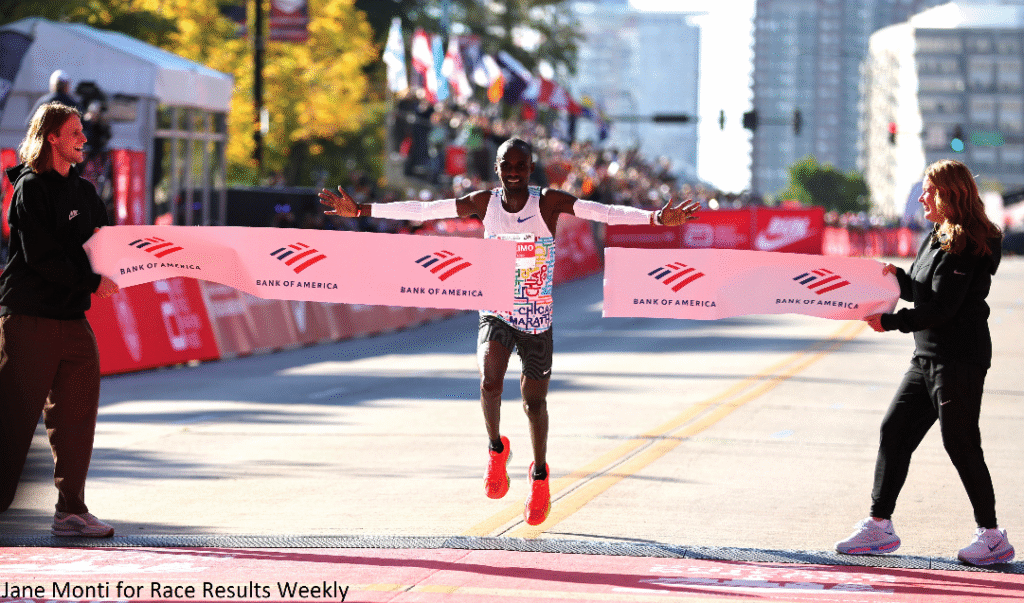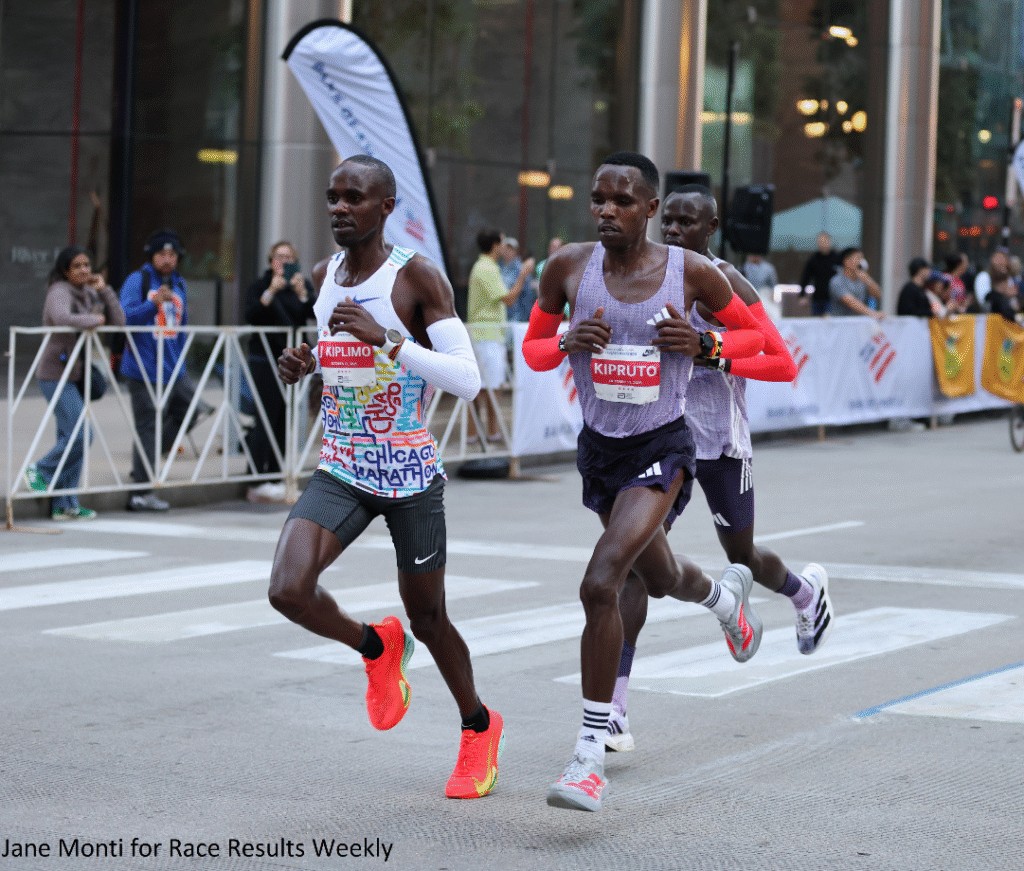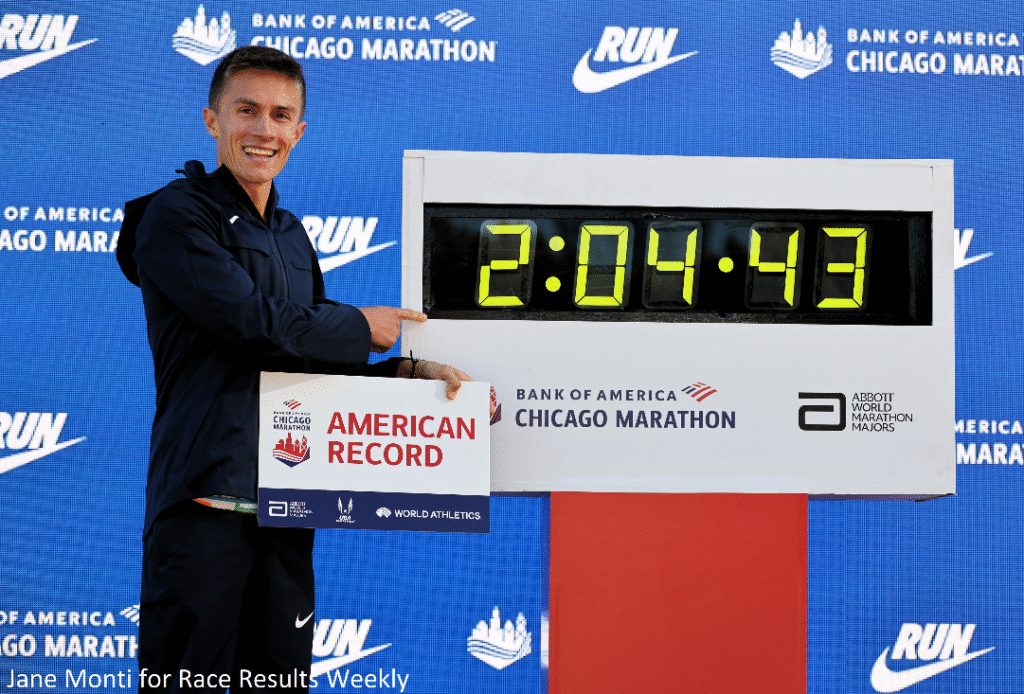**Mantz Gets North American Record**
By David Monti, @d9monti
(c) 2025 Race Results Weekly, all rights reserved
CHICAGO (12-Oct) — Uganda’s Jacob Kiplimo and Ethiopia’s Hawi Feysa dominated today’s 47th Bank of America Chicago Marathon, recording fast winning times of 2:02:23 and 2:14:56, respectively. Kiplimo, 24, running in only his second marathon, was on world record pace through 35-K, but slowed in the final kilometers and had to settle for the win and the second-fastest time ever at Chicago. He was also the race’s first Ugandan winner. Feysa, 26, ran nearly identical halves of 67:30 and 67:26 to set a personal best of 2:14:56 and got her first-ever Abbott World Marathon Majors title. Both winners won $100,000 in prize money.
Also, two-time NCAA cross country champion Conner Mantz finished fourth setting a North American record of 2:04:43. He also smashed Khalid Khannouchi’s 23 year-old USA record of 2:05:38 set at the London Marathon in 2022, and even eclipsed Ryan Hall’s all-conditions American best of 2:04:58 set in Boston in 2011.
MEN START (TOO?) FAST
The men’s race got off to a blistering start which no doubt ruined the chances of several of the race’s top contenders. After a scorching first mile of 4:25, the lead group went through the 5-K checkpoint in 13:58, on pace for a sub-1:58:00 marathon. Mantz, who was only another five seconds back, knew the race had gone out too hard, and quickly tried to settle himself down.
“Well, I guess I warmed up well enough,” he joked in his post-race broadcast interview when asked about the fast first mile.
Three pacemakers –Kenya’s Barselius Kipyego and Amon Kemboi and Britain’s Patrick Dever– led the contenders through the first 5-K split. In addition to Kiplimo, defending champion John Korir of Kenya was right near the front along with compatriots Timothy Kiplagat, Philemon Kiplimo, and Amos Kipruto. Mantz was in the second group 25 seconds back.
The pace moderated in the next 5-K segment (14:27), and Kemboi dropped out. Kipyego and Dever continued to shepherd the five contenders through 15-K in 42:41 and halfway in 1:00:16. Only Kiplagat would drift off the pace by that point, but he was just four seconds back.
Surprisingly, Korir decided to make an early bid for victory. He surged after the halfway point (where the pacers dropped out) and the lead pack immediately fell apart. Kiplimo initially went backwards, but slowly caught up to Korir. The pair went through 25-K in 1:11:12 meaning their last 5-K split was a snappy 14:06. That fast segment ended up killing the races of Korir, Philemon Kiplimo, and Kiplagat. Korir, who also won the Boston Marathon last April, only made it to 20 miles before dropping out; Philemon Kiplimo would finish 8th (2:06:14); and Kiplagat would finish 12th (2:07:42).
Running side by side, Kiplimo and Korir kept the pace high and the world record in play. Kiplimo ran 14:19 from 25 to 30-K. That was too fast for Korir who fell back and would record his last split at the 20 mile mark before dropping out. Kiplimo was still on world record pace through 30-K (2:00:16 predicted time), but he said later that he wasn’t thinking about that.
“It was not something easy to prepare for this race,” he told reporters later on. He continued: “I think to me my coming here was just to run a good race.”
Kiplimo ran the next four miles in 4:32, 4:38, 4:46, and 4:50 (15:17 from 35 to 40-K). The world record had slipped away, but Kiplimo was happy.
“For me I was just keeping the pace to finish the race well,” he said. “The legs were a little bit tired. I was just trying to keep the pace.”
Kipruto, who was part of the original lead group, held on to finish second in 2:03:54. Alex Masai –the former NCAA athlete for Hofstra University who is now part of the Flagstaff-based Hoka Northern Arizona Elite– finished third in a personal best 2:04:37 after running much of the race with Mantz. The two worked together, Mantz said.
“Alex and I were communicating quite a bit,” said Mantz, who had raced Masai during his collegiate career. “I owe him a lot.”
MAGICAL DAY FOR MANTZ
For Conner Mantz, the race could not have gone any better. He didn’t get swept up in the super-fast pace of the leaders in the first half, and instead stuck with his plan to run about 62 minutes for the first half (his official split was 62:19). In the second half, he kept his pace consistent which allowed him to move up from eighth position to fourth as other athletes faltered. He had his eyes on the podium in the final kilometers (he called a top-3 finish one of his “stretch goals”), but could not match Masai’s sprint speed in the final 200 meters. Still, fourth place and the North American record was a huge accomplishment for the 28 year-old.
“I had been eyeing this record for a long time,” said Mantz, who already had the national half-marathon record of 59:17. He continued: “It feels really good.”
Mantz revealed after the race that his fall season isn’t over. After a brief recovery period, he plans to re-boot his training so he can compete in the USATF Cross Country Championships in Portland, Ore., the national selection race for Team USATF for the 2026 World Athletics Cross Country Championships in Tallahassee, Fla., on January 10th.
“That’s been on the plan for me for a long time,” Mantz said of World Cross. “Even during the race I was like, as long as I get this record I’m doing World Cross.”
FEYSA BANKED ON A STEADY PACE
For women’s champion Hawi Feysa, who was sixth at the World Athletics Cross Country Championships in 2023, she had no interest in fast starts or mid-race surges. Instead, she chose to run at a level pace and hoped that by targeting a 2:15:00 finish time she would end up first.
“I felt pretty confident,” she said through a translator. She added: “That was pretty much the plan. We work on this kind of consistent pacing (in training).”
With the help of a male pacemaker, Chala Beyo Techo of Ethiopia, she and Tanzania’s Magdalena Shauri went through halfway in 1:07:30, exactly on 2:15 pace. Two other Ethiopians, Mergertu Alemu and Ejgayehu Taye were seven seconds back and were the only other athletes in contention for the podium.
Feysa and Shauri were still together through 25-K (1:19:59), but Shauri would soon fall back. By 30-K Feysa was alone and without speeding up increased her gap to two minutes and 22 seconds by the finish line. Remarkably, Feysa ran the second half just four seconds faster than the first.
“The race conditions were good, the course was good,” Feysa said matter of factly through a translator. “My coach gave me a lot of good preparation heading into this race. I only just learned that I broke 2:15 and I’m really happy about that.”
Alemu took second in 2:17:18, Shauri got third in 2:18:03, and two Kenyans –Loice Chemnung and Mary Ngugi-Cooper– rounded out the top-5 in 2:18:23 and 2:19:25, respectively. It was the first time at this race that five women broke 2:20:00.
Natosha Rogers, 34, was the top American in sixth place. She backed up the 2:23:51 she ran in Nagoya last March with a 2:23:28 personal best here.
“Based on my training I actually went out conservative,” Rogers told reporters. She continued: “I was hoping for a 2:22, but I was feeling it out there; I got some bad waves and I got some good waves. But, it’s so much mind over matter. It’s so much mental. Every part of that course was just so beautiful.”
Paris Olympian Dakotah Popehn, who was targeting 2:20:00, finished seventh (second American) in 2:24:21 after hitting halfway in 1:10:44.
CHICAGO SHOWS UP
The people of Chicago have always embraced the marathon, and after some politicians made disparaging remarks about the city (President Trump called the city a “death trap” last month) the city’s citizens turned out en masse to support today’s race. Large groups of spectators could be seen along the route on the race’s broadcast.
“For me, what I was so impressed with was the outreach from the community,” said executive race director Carey Pinkowski, when asked to reflect on today’s race. He added: “This is an amazing ecosystem. Just about every city agency was involved.”
PHOTO: Hawi Feysa of Ethiopia winning the 2025 Bank of America Chicago Marathon (photo by Jane Monti for Race Results Weekly)
PHOTO: Jacob Kiplimo of Uganda just before the halfway point of the 2025 Bank of America Chicago Marathon with Amos Kipruto of Kenya (photo by Jane Monti for Race Results Weekly)
PHOTO: Jacob Kiplimo of Uganda winning the 2025 Bank of America Chicago Marathon; 2024 Olympic 1500m champion Cole Hocker helped hold the finish tape (photo by Jane Monti for Race Results Weekly)
PHOTO: Conner Mantz after setting the North American marathon record at the 2025 Bank of America Chicago Marathon (photo by Jane Monti for Race Results Weekly)
– – – – – – – –
RACE RESULTS WEEKLY is sponsored by RunCzech, organizers of the Prague Marathon and a series of iconic running events, including the Prague Half Marathon, part of the SuperHalfs, and Italy’s fastest half marathon, the Napoli City Half Marathon. Learn more at runczech.com.
ENDS
Feysa_Hawi_Winning_Chicago_12-Oct-2025_Jane_Monti_With_Credit.jpg

Kiplimo_Jacob_Chicago_Marathon_Finish_Hocker_Tapeholder_12-Oct-2025_Jane_Monti_With_Credit.jpg

Kiplimo_Jacob_Kipruto_Amos_Chicago_Marathon_Mile_13_12-Oct-2025_Monti_Jane_With_Credit.jpg

Mantz_Conner_Chicago_Marathon_American_Record_Clock_12-Oct-2025_Jane_Monti_With_Credit.jpg

